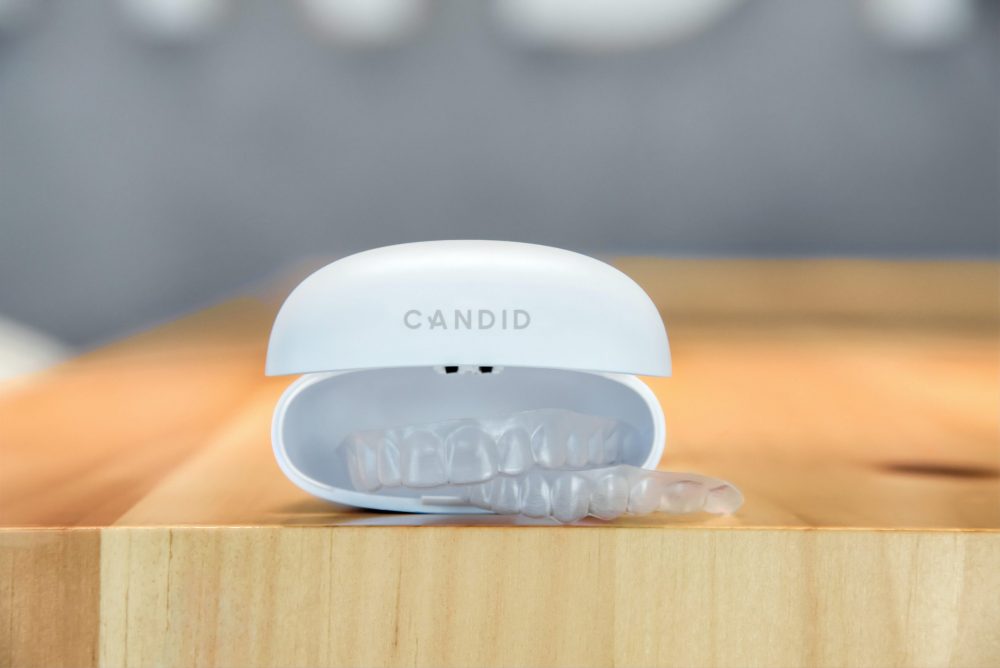
How To Clean Mouthguards For Grinding Teeth
April 30, 2024
Can You Wear Invisalign Only At Night? No. Let Us Explain
May 2, 2024Key Takeaways:
Understanding Bruxism:
Understand the significance of teeth grinding (bruxism) as a serious dental issue.
Symptoms and Consequences:
Learn the main symptoms of teeth grinding, such as worn or chipped teeth, jaw pain, and headaches as well as increased tooth sensitivity.
Prevention and Treatment:
It is possible to prevent teeth grinding through stress management techniques, mouthguards, dental interventions such as orthodontic treatments, and dental interventions like braces.
Best Mouthguard For Grinding Teeth
We will explore the best mouthguard for grinding teeth available and tips on choosing the best one for your needs.
By equipping yourself with knowledge and guidance from this article, you can make informed decisions about managing stress-induced grinding or enhancing dental protection.
What Exactly Is Teeth Grinding
Teeth grinding, clinically known as bruxism, refers to the unconscious clenching and grinding of teeth that often occurs during sleep, without the individual’s awareness. This habitual behavior can be triggered by various factors, such as stress, anxiety, misaligned teeth, or underlying sleep disorders.
The repetitive grinding motion can have detrimental effects on dental health, including the gradual erosion of tooth enamel, heightened tooth sensitivity, jaw pain, recurring headaches, and potentially temporomandibular joint (TMJ) disorders.
Bruxism must be treated as soon as possible to avoid further issues and safeguard teeth from unnecessary wear and strain. Individuals who seek professional advice and adopt suitable measures can effectively treat bruxism and maintain their dental health in the long run.
What Causes Teeth Grinding
Nighttime teeth grinding is one example of a sleep-related movement issue. The problem originates in the central nervous system. Bruxism can be caused by lifestyle or medical conditions, too.
Also, certain lifestyle habits, such as excessive alcohol consumption, caffeine intake, or tobacco use, may increase the risk of teeth grinding. Additionally, irregular sleep patterns or insufficient sleep can play a role in the development of bruxism. Medical conditions like gastroesophageal reflux disease (GERD), Parkinson’s disease, or Huntington’s disease can also impact nerve signaling and muscle control, leading to bruxism as a symptom.
Stress and Anxiety Also Cause Teeth Grinding
Anxiety and stress are common triggers for teeth grinding, which can create excessive tension in the jaw muscles. The emotional components of bruxism must be considered because they play an important role in the development of this tooth disorder. When people are stressed, they may involuntarily clench or grind their teeth, especially while sleeping. This persistent grinding action can cause chronic jaw muscle pain and increased tooth sensitivity over time.
Addressing the underlying pressures is critical for successfully controlling teeth grinding. Implementing stress management measures like meditation, deep breathing exercises, regular physical activity, and getting enough sleep can help reduce the frequency of teeth-grinding episodes and relieve associated symptoms.
Sleep Disorders Are Also Connected To Teeth Grinding
Sleep disorders such as sleep apnea or restless leg syndrome can contribute to nighttime teeth grinding, disrupting sleep quality, and causing oral health issues.
Individuals’ natural sleep cycles are disrupted when they have poor quality sleep from conditions like sleep apnea, which increases the likelihood of teeth grinding. Clenching and grinding your teeth while sleeping can cause severe harm to your teeth and jaw muscles over time. Addressing underlying sleep disorders through correct diagnosis and treatment can enhance peaceful sleep and reduce jaw movement, resulting in fewer nighttime bruxism episodes.
Medications Can Be A Cause As Well
Some medications, like antidepressants or stimulants, can have side effects that include teeth grinding as a potential symptom. This can contribute to dental problems such as worn-down teeth, jaw discomfort, headaches, and disrupted sleep patterns. Even certain antipsychotic medications, amphetamines, and commonly used over-the-counter medications may trigger teeth grinding in certain individuals.
If you suspect that your medication is causing bruxism, it is crucial to schedule a dental visit for a thorough evaluation. A comprehensive dental assessment can help determine the underlying cause of the teeth grinding and allow for implementing appropriate management strategies.
Symptoms of Teeth Grinding
Understanding the subtle signs of teeth grinding can provide significant insight into your dental and overall health. Recognizing these indicators early on allows you to proactively address any underlying abnormalities and ensure the long-term health of your teeth and jaws. Let’s explore the most common symptoms:
Worn or Chipped Teeth
Worn or chipped teeth are apparent signs of teeth grinding, as they demonstrate excessive pressure and friction on the teeth during sleep or even wakeful grinding activities. This constant grinding movement can gradually wear down the protective enamel layer, leaving the teeth more vulnerable to further damage and decay. The repercussions of teeth grinding go beyond aesthetic concerns and impair the structural strength of the teeth.
Jaw Pain
Jaw pain is a typical symptom of teeth grinding, and it is usually caused by excessive pressure on the temporomandibular joint (TMJ) while clenching or grinding. This pressure may cause inflammation in the jaw muscles and surrounding tissues, resulting in discomfort and limited jaw movement. Not treating this can exacerbate these symptoms, resulting in headaches and ear pain.
Headaches
Headaches are a frequent result of teeth grinding, arising from the strain on jaw muscles and tension in the head caused by grinding habits. The continuous clenching and grinding can lead to muscle tension headaches, particularly affecting the neck muscles as well. Also, increased pressure on the temporomandibular joint during teeth-grinding episodes can cause tension-type headaches and migraines.
How Can Teeth Grinding Be Prevented
Stress Management Techniques
Stress reduction is vital in preventing teeth grinding as stress and anxiety are significant contributors to bruxism. Managing stress effectively through relaxation activities such as yoga, tai chi, or pilates for example can reduce grinding episodes. Mindfulness meditation and deep breathing exercises also play a role in calming the mind and body, decreasing the likelihood of involuntary clenching or grinding of teeth.
Use of Mouthguards
Custom-fitted mouthguards, commonly known as mouthguards, are intended to protect teeth from the effects of grinding while asleep. A dentist can make a custom mouthguard Charlotte NC that fits your teeth perfectly, creating a cushioning barrier to minimize tooth damage from grinding movements. Wearing a mouthguard every night can dramatically lessen the effects of teeth grinding on your teeth and oral health. We will delve into which mouthguards are best for grinding teeth further in this article.
Dental Corrections
Orthodontic treatments may be recommended to improve teeth alignment and correct any bite misalignments that contribute to bruxism. By aligning the teeth properly, orthodontic interventions can reduce the strain on the jaw muscles and decrease the tendency to grind teeth. Dental corrections may also include restorative dentistry procedures to repair any existing tooth damage caused by grinding, such as dental crowns Charlotte NC, or fillings.
Behavioral Changes
Identify and address any habits or triggers that may contribute to teeth grinding, such as chewing on pencils or pens, clenching the jaw during the day, or excessive caffeine or alcohol consumption. To prevent nightly grinding, practice proper sleep hygiene by sticking to a consistent sleep schedule, developing a calming bedtime routine, and creating a pleasant sleeping environment.
What Are the Different Types of Mouthguards
There are several types of mouthguards available, each designed for specific purposes and varying levels of protection. Let’s explore the different types of mouthguards and their unique features to help you understand which one might be most suitable for your needs.
Stock Mouthguards
Stock mouthguards are prefabricated and designed to be worn immediately without any modifications. They offer basic protection for the teeth but may lack the personalized fit of other mouthguard types. Typically made from flexible thermoplastic material, these mouthguards are readily available in sports stores and pharmacies. However, their one-size-fits-all design can sometimes result in discomfort or a less secure fit compared to more specific types of mouthguards that we will mention further.
A proper fit is essential for effective prevention of teeth grinding, as a well-fitted mouthguard can absorb and disperse the force of teeth clenching during sleep or sports activities, thus reducing the risk of dental damage.
Boil-and-Bite Mouthguards
Boil-and-bite mouthguards are adaptable mouth protectors that can be personalized to fit an individual’s bite pattern. They become moldable after softening in hot water, allowing the user to achieve a customized fit for maximum protection during sports or other activities. Their versatility makes them a favored option among athletes and individuals with varying mouth shapes.
To keep the mouthguard in good condition, proper care is necessary. Regular cleaning with a soft brush and mild soap or dedicated mouthguard cleaner helps prevent bacterial buildup and prolongs the mouthguard’s lifespan. Ask your dentist how to clean your mouthguard for grinding teeth.
Custom-Fitted Mouthguards
Custom-fitted mouthguards are expertly crafted dental devices that offer personalized comfort and protection by molding precisely to an individual’s teeth alignment and bite relationship. This customized approach guarantees a secure fit, providing optimal cushioning to absorb the impact of teeth grinding and consequently reducing the risk of dental damage and jaw pain. Obtaining a custom mouthguard requires dental visits for a thorough evaluation, assessing the unique requirements of each individual’s teeth and jaws.
Regular dental check-ups are crucial for ensuring the ongoing effectiveness of the mouthguard, allowing for necessary adjustments as needed. Additionally, proper maintenance plays a key role in prolonging the mouthguard’s lifespan and maintaining its hygiene standards.
Night Guards
Nightguards are custom-made dental prostheses designed to be worn while asleep. They play an important role in dentistry by providing protective cushioning and avoiding teeth grinding.
Night guards are made of strong materials like acrylic resin or soft plastic, ensuring resilience and comfort throughout the night. These guards are designed to fit securely over the upper or lower teeth, forming a barrier that absorbs the excess force generated during teeth-grinding episodes. Night guards protect teeth against wear, fractures, and other damage by absorbing the impact.
They reduce stress on the temporomandibular joint (TMJ) and surrounding muscles by creating a cushioning layer between the upper and lower teeth, resulting in a more calm and comfortable sleep experience.
Double-Layer Mouthguards
One of the key benefits of double-layer mouthguards is their ability to offer dual protection: the soft inner layer absorbs shock and minimizes the risk of dental emergency in Charlotte NC, while the sturdy outer layer provides robust defense against impacts and abrasions.
Athletes who compete in physically demanding and contact-intensive sports like football, hockey, rugby, mixed martial arts (MMA), and boxing are most commonly in need of double-layer mouthguards. Athletes in these high-impact sports are constantly exposed to collisions, tackles, punches, and falls, all of which can result in serious tooth injuries if necessary precautions are not taken.
Understanding the variety of mouthguards available is important for making informed choices about oral protection and general dental health. Whether you’re an athlete looking for a strong defense in contact sports or someone who struggles with teeth grinding, selecting the appropriate mouthguard can make a big difference in protecting your oral structures.
How to Choose the Right Mouthguard for You
Choosing the right mouthguard involves careful consideration of several factors to ensure optimal comfort, protection, and effectiveness. First and foremost, it’s essential to identify your specific dental goal and the primary purpose for which you require a mouthguard.
Are you looking to protect your teeth during sports activities, prevent teeth grinding (bruxism) at night, or address a specific dental condition such as temporomandibular joint disorder (TMJ)? Understanding your dental needs will help narrow down the options and guide your decision-making process.
Once you’ve identified your dental needs, consider the different types of mouthguards available. Stock mouthguards are pre-formed and ready-to-wear but may lack a customized fit, while boil-and-bite mouthguards can be molded at home for a personalized fit after softening in hot water.
Alternatively, custom-fitted mouthguards are professionally crafted to your bite pattern and jaw alignment, offering the highest level of comfort and protection. Assessing the type of mouthguard that best suits your needs and preferences is crucial for ensuring a comfortable and effective fit.
Keep in mind to select a mouthguard made from durable materials such as silicone, thermoplastic elastomer, or hard acrylic that can withstand regular use without losing shape or effectiveness. Each material has its advantages in terms of comfort, durability, and impact resistance, so choose one that meets your preferences and requirements.
By carefully considering these factors, seeking professional guidance, and following proper care practices, you can choose the right mouthguard that meets your needs, provides optimal comfort and protection, and contributes to your oral health.
What Is the Best Mouthguard for Grinding Teeth
The best mouthguard for grinding teeth depends on individual factors such as the severity of the grinding, comfort preferences, and budget.
It is recommended to visit a dentist who is knowledgeable in oral appliance therapy if you require expert dental care specifically for mouthguards. They may evaluate your situation, recommend the best type of mouthguard, and advise you on proper use and maintenance to help relieve teeth-grinding symptoms and safeguard your dental health.
If you want expert guidance and personalized care for mouthguards, schedule an appointment with Langley Dental Care today to safeguard your dental health and effective teeth grinding prevention.
Frequently Asked Questions
What is the best mouthguard for grinding teeth?
The best mouthguard for grinding teeth is one that is specifically designed to protect your teeth and jaw from the effects of grinding or clenching. Look for a mouthguard that is custom-made by a dentist for the most comfortable and effective fit.
How does a mouthguard help with grinding teeth?
A mouthguard creates a protective barrier between your upper and lower teeth, preventing them from coming into direct contact while you sleep. This helps to reduce the damage caused by grinding or clenching, such as tooth wear and jaw pain.
Are there different types of mouthguards for grinding teeth?
Yes, there are three main types of mouthguards for grinding teeth: stock mouthguards, boil-and-bite mouthguards, and custom-made mouthguards. Custom-made mouthguards are generally considered the best option as they provide the most precise and comfortable fit.
Can I wear a mouthguard for grinding teeth during the day?
While it is not recommended to wear a mouthguard for grinding teeth during the day, some individuals may find relief from jaw pain or tension by wearing a mouthguard while awake. However, it is important to consult with a dentist to ensure the proper fit and to prevent potential damage to your teeth and gums.
How long does a mouthguard for grinding teeth last?
The lifespan of a mouthguard for grinding teeth will vary depending on the type of mouthguard and the severity of your grinding or clenching. Generally, custom-made mouthguards made by a dentist can last up to several years with proper care and regular check-ups.
Can I still talk or drink water while wearing a mouthguard for grinding teeth?
Yes, most mouthguards for grinding teeth are designed to allow for comfortable talking and drinking water while wearing them. However, it is important to avoid chewing on the mouthguard as this can cause damage and affect its effectiveness.



